#by like. an eagle?
Explore tagged Tumblr posts
Note
We need a td character that in the middle of a challenge gets taken away never to be seen again
.
#by like. an eagle?#double elims are out time to introduce td characters getting abducted by an eagle#anonymous#total drama#total drama island
42 notes
·
View notes
Text
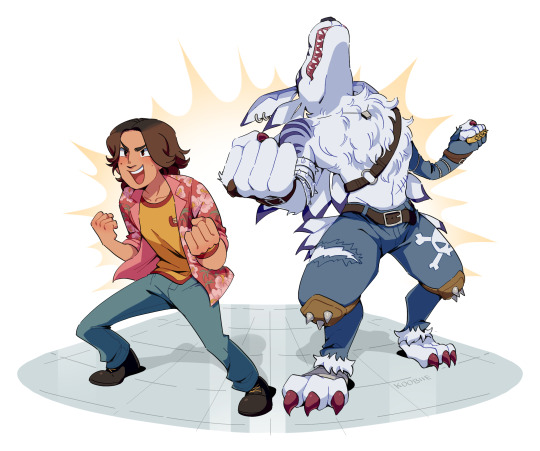
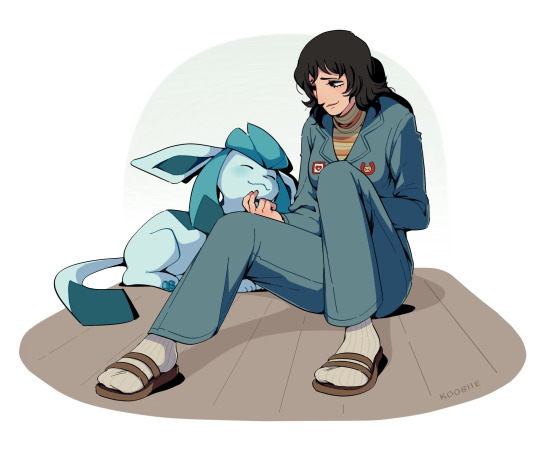
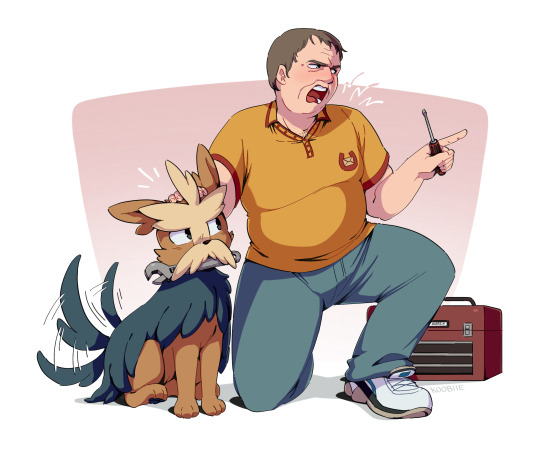

based on that one q&a... i'm a sucker for a pokemon crossover
#this is likely the first and last time i will ever EVER draw a digimon lol. i did it for you daisuke#eagle eyed viewers will notice i didnt draw jimmy. this is because i didnt want to#but also im convinced he wouldnt have a partner pokemon#i feel like hed think all the realistically obtainable ones were too lame or weak and would only settle for Mega Rayquaza#swansea to me is like the team rocket grunt whos Evil but has a crobat so youre like oh.. he also has a heart?!#like hes a jerk but his herdier loves him so maybe hes not that bad#mouthwashing#anya mouthwashing#curly mouthwashing#daisuke mouthwashing#swansea mouthwashing#mouthwashing game#pokemon#weregarurumon#digimon#glaceon#pikachu#herdier#digital art#koob art#procreate#illustration#1k#2k
4K notes
·
View notes
Text
love the implication that the eagle is just as fed up with this arrangement as prometheus and now they've unionized
#been eating the same unseasoned liver every day for millennia and was like actually? fuck olympus. fuck you guys#hades#hades 2#hades 2 spoilers#and why yes i DID just do a run and get slaughtered by prometheus BUT i did get him down to half health#twas the eagle that got me#em.chats#EDIT: THE EAGLE'S NAME IS AETOS. THANK YOU EVIL EYE KEEPSAKE FOR THE LORE
2K notes
·
View notes
Text
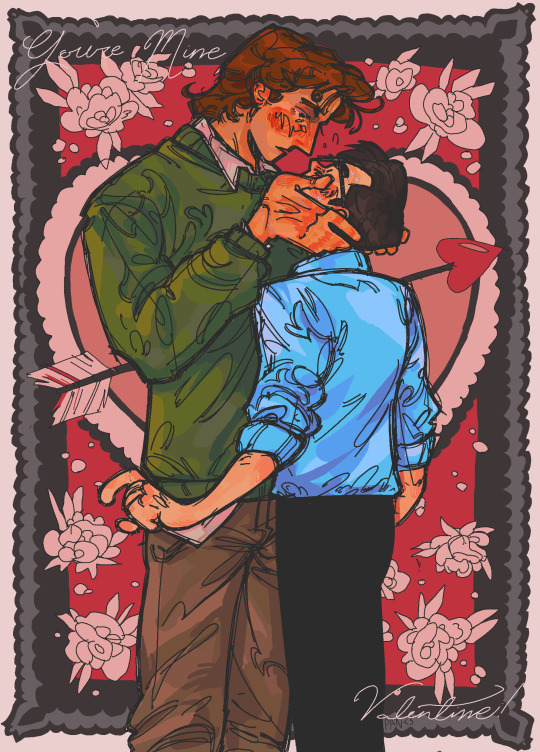
i think dan should get to be a little weird too. as a treat
#my art#re animator#herbert west#daniel cain#dan cain#danbert#no but srsly guys i get that hes the normal guy but you forget ... HES ALSO WEIRD !!! HES SO STRANGE !!!#if he was normal he would have called the cops on herbert ages ago#but guess what babey he ... well technically he did call the cops but he waited like 20 years to do it so .. !!#bro was an enabler dont forget that#sorry im like rlly crazy about dan...#which is unfortuante bc i feel kind of alone in that like YES herberts a baddie YES hes litterally me#but dan....... DAAAAAAAAAAAN (eagle screeching)#what the fuck am i saying!#edit hey guys its actually lucid dog that rant you see above you was written at likes 6am after an all nighter#we all know dan is weird i mainly meant i think he should get to be PORTRAYED as weird more#really im just weird about him (<3) and i need him to reflect that
2K notes
·
View notes
Text


when the light does the thing that makes you feel like you were here 20 000 years ago
#sometimes i'm basically trying to claw my skin off to get out of this town but then sometimes days like this happen#also: had a VERY nice sighting of a brown snake eagle which i've only seen once before#and it was at kruger national park some years ago#diary#the photos i got? not so nice
19K notes
·
View notes
Text
WAIT WAIT WAIT

YOU'RE TELLING ME
THE TITLE CARD FROM CINDERELLA (1950) EXPLICITLY SAYS IT'S BASED ON THE PERRAULT VERSION OF THE STORY???
WE COULD HAVE AVOIDED ALL THE SANCTIMONIOUS EDGELORDS SMARMING ABOUT HOW "well Disney toned it down; the One True Grimms' Original akschully has blood and no fairy and feet getting cut up, so there" IF THEY HAD JUST
BOTHERED TO PAY ATTENTION TO THE MOVIE AND THEN GOOGLE "PERRAULT CINDERELLA???"
excuse me I need to go scream into a pillow
(I'm not saying Ashenputtel isn't possibly older as a folktale than its 1812 publication date in the Grimms' book, but Perrault's version was published in the 1690s. so...)
#fairytales#folktales#cinderella#disney#charles perrault#the brothers grimm#and if you're obsessed with originality. the earliest recorded version of the story is like a paragraph long and completely bloodless#'there was a lovely courtesan. an eagle carried one of her sandals to Pharaoh. he used it to find her and married her. The End."#(Rhodopis if you want to look it up)
2K notes
·
View notes
Text
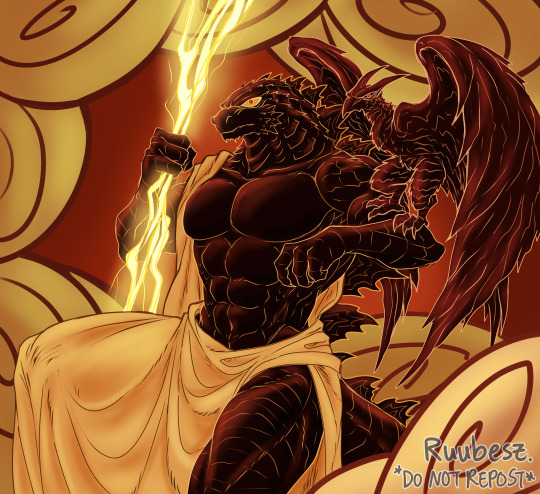
Zeuszilla? Zuezilla? Zeusilla???? Idk but it's trending on Twitter rn
Anyway, my contribution haha I'll just put this here and disappear!
#godzilla#godzilla x kong: the new empire#zeus#zeuszilla#it's a trend on twitter lol#so i give mine#it sucks idk why I gave him hooman body but it kinda worked?????#anyway wanted to add Rodan as the eagle that's always with zeus#tbh i don't like zeus#kinda sad they comparing him to Godzilla#BUUUTTT it's disney version so i'll allow it#lol#anyway enjoy#do not repost#my art
1K notes
·
View notes
Text
hope; 🦅
There always is and should be.
So not where we left off yesterday,
again today...
To hope.. 🦅
#eagles#american eagle#animals#animal kingdom#cute animals#wildlife#wild animals#animal#love animals#animals lovers#animals video#love birds#bird lover#birds#birds lovers#nature of nature's art#amazing nature#oh wowww#wow art#wow wow wow#like wow#wow#nature art#nature
544 notes
·
View notes
Text


#assassin's creed#desmond miles#ezio auditore#altair ibn la'ahad#connor kenway#Altair is where he got his Eagle Vision#Ezio is when he started to really come around and feel like an assassin#and Connor is when he started acting like an assassin#my art
693 notes
·
View notes
Text
I cannot believe it took me this long to draw anything from DHMIS

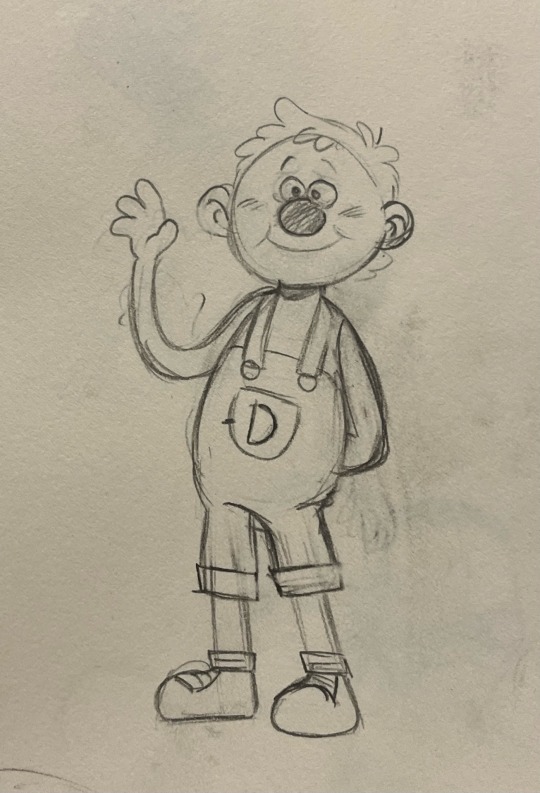
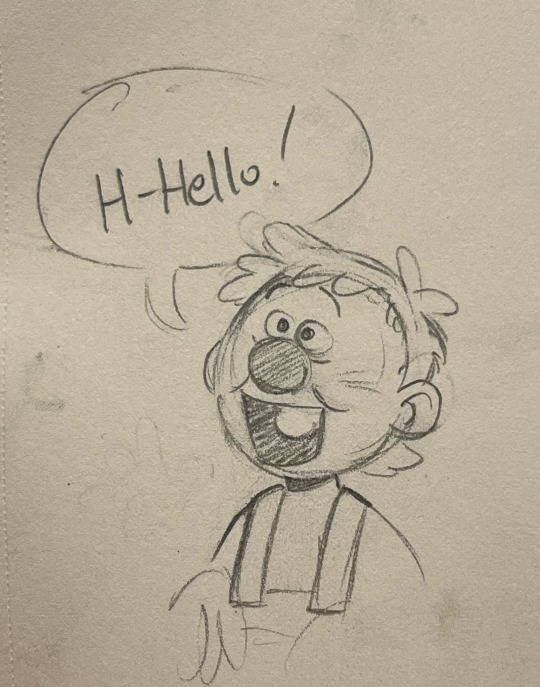
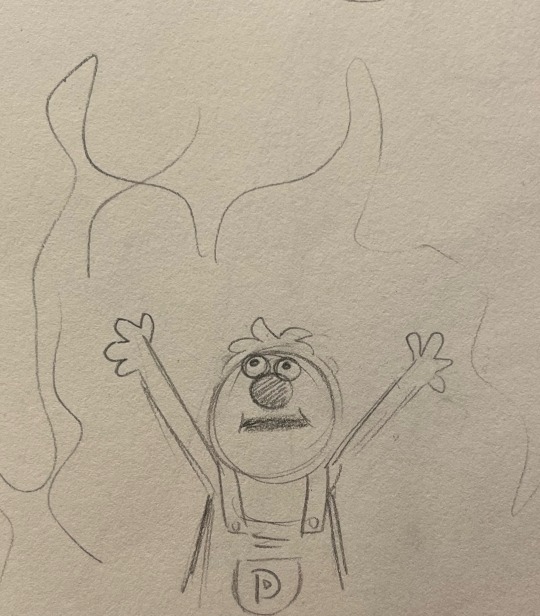
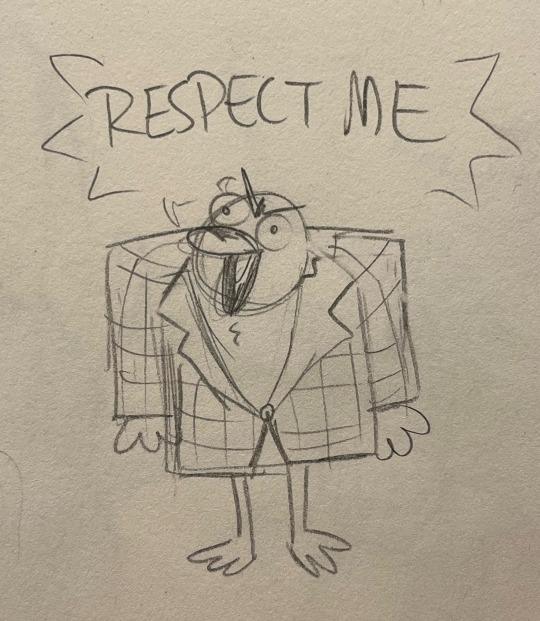
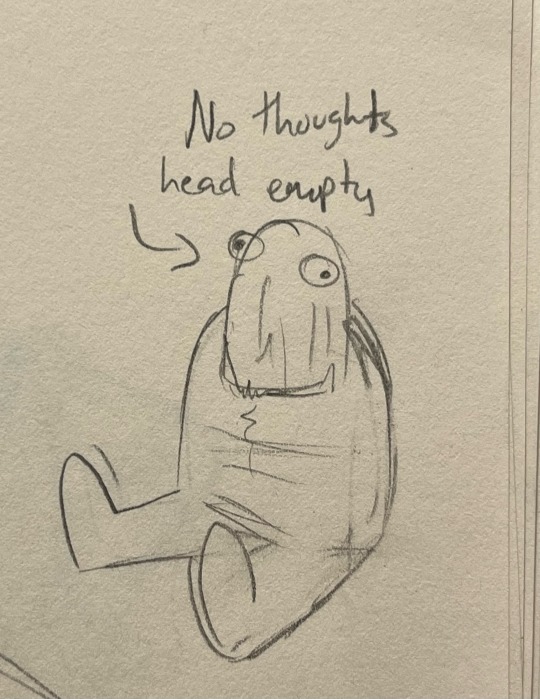


Please enjoy these lovely doodles
I apologize for being super inactive lately! I’ve been super busy! Don’t worry tho, I’ve been working on something!! 😎👍
#don’t hug me i’m scared#dhmis#dhmis red guy#dhmis yellow guy#dhmis duck#fluffybird#warren the eagle#warren the worm#traditional illustration#at this point I’m collecting puppet horror like it’s Pokémon#oh traditional art how I’ve missed you#why is my traditional art so much better 😭
2K notes
·
View notes
Text
I do think that William 'I only tell the truth' de Worde and Moist 'I only tell lies' von Lipwig are physically incapable of being im the same room. There is a forcefield.
#discworld#sacharissa and moist is fun they are like if prometeus and the eagle both were into it#i think moist and william never directly interact because it would just be#No.#but they could be guarding doors together
791 notes
·
View notes
Text
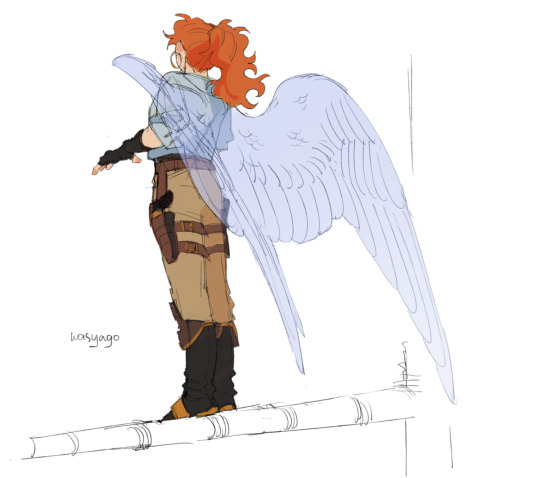
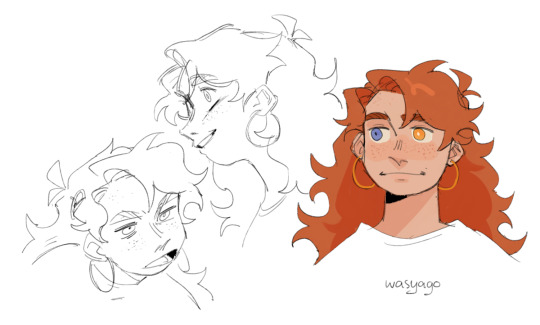
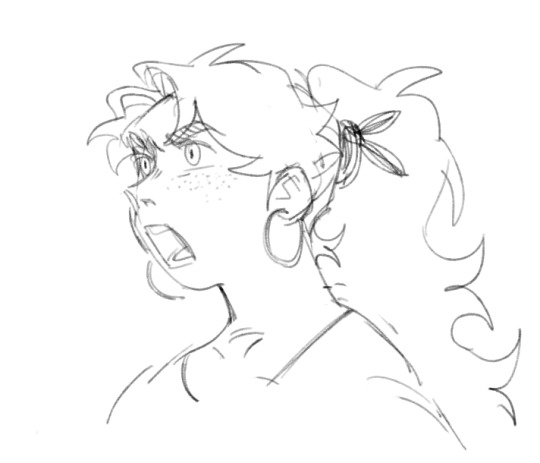
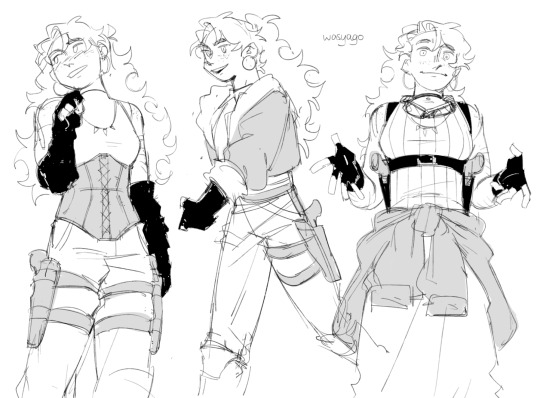
day 16482 of trying to figure out what color jay's magic is
#jrwi riptide#jay ferin#i just think she's neat 😳#also like. what color is her magic?????? it's green but its also blue but its also possibly fiery yellow??? like. gurl please pick one#blue wings did look better than green or yellow tho so um. yeah.#but for healing and stuff? i swear i remember it being green. and there was this magical green eagle during la alma arc? mannn#it would make sense for it to be green because she learned magic around her mother (probably?) and uh...#i dont know how these facts related but they are.#but also the ferin part of her family all have yellow fire magic? I think?#but she's also *jay* so like. blue.#mhmmhmhmhmmhmh#i suppoooose it can be all the different colorsss but like.... the consistency....#sigh#my art#sketch
3K notes
·
View notes
Text
Jean Valjean's Canon Toxic Unhealthiness around Romantic Love
( alternate titles: “Does Jean Valjean is Gay?”, or “Does Jean Valjean is Asexual?” Or: “Why is it so difficult to slap an identity/sexuality label onto Jean Valjean?” Or “LGBTPTSD+”)
I was looking at the responses to this poll about whether people interpret Jean Valjean as gay/asexual/straight or something else….and it got me thinking again about Jean Valjean’s canonical intense, complex, awful, toxic, and overwrought emotions around identity/ romantic love. I want to talk about that for a bit because I think it often gets overlooked in fandom!
I've noticed that Les Mis fandom/analysis often tends to interpret Jean Valjean as being far more content, more "at peace with himself," and more "comfortable in his own skin" than he ever is within the novel. This is also a common change in adaptations. The musical's version of Jean Valjean is great-- but he also seems a lot more self-actualized, more like he's gotten himself completely "figured out" by the end of the story. Other, bad, Les Mis adaptations — the adaptations that generally portray Jean Valjean a worse more violent person — also usually make Jean Valjean more confident in himself, more confident in his own feelings/desires, more certain that he’s entitled to certain things, and more willing to demand or take what he wants.
But one major aspect of book Jean Valjean's personality is that he does not have a healthy relationship with anything about himself. He has a tortured broken relationship with his own identity. He repeatedly thinks about “Jean Valjean” as a person outside of himself, a person who he finds frightening, repulsive, savage, and horrible— like a wild animal he needs to sedate, or beat into submission. He is obsessed with self-denial and self-repression. He is fixated on the idea that he is subhuman, that he is not allowed to want things or to pursue having any kinds of relationships with other people-- and that the most heroic thing he can do is "grab himself by the collar” and violently force himself to stay away from the things he wants. He is desperate to be loved and fixated on being unworthy of love and on denying himself love. He is absolutely not at peace with his identity: to paraphrase Jean Valjean in one of the later chapters, he believes he can only gain inner peace by “eviscerating his own entrails.”
He is never truly content with who he is, what he wants, or what kind of love he wants— and he never learns to be. The novel ends with him cutting himself off from his only family, breaking ties with the only person who loves him, and essentially slowly killing himself out of self-loathing.
There are other characters in Les Mis who seem very content with who they are and what they want. Enjolras is self-assured in his identity, and doesn’t appear to feel like there is any kind of love that is missing from his life. Whether you interpret him as gay or ace or trans or w/e, book!Enjolras is written as someone who is extremely self-assured and has a loving support system that is enough to keep him happy. But I don’t think that’s true for Jean Valjean at all XD.
And that’s why it's hard to apply labels like “aromantic” or “ace” or gay/straight/etc to Jean Valjean, when talking about his canon characterization. Those labels imply the person has a basic level of comfort with acknowledging their own desires/lack of desire/identity. And Jean Valjean never achieves that level of comfort. What “label” do you give to someone whose relationship with their identity is “I do not belong in a family, I have no right to want things, I have no right to be happy, I am outside of life, and I will never be at peace until I eviscerate my own entrails?” Is there a “self-disembowelment" pride flag? XD I've seen a lot of interpretations that go "Jean Valjean never expresses any interest in romance, he's perfectly content just to have his relationship with his daughter" but I honestly don't think that's true. Jean Valjean tries to content himself with having only Cosette. But part of why everything explodes so catastrophically in the end of the novel is because he needs more than just a paternal relationship. He doesn’t try to have a “normal” father-daughter relationship with Cosette, he tries to force his relationship with Cosette to be literally everything and everyone to him, for her to be his entire world: and it doesn’t work.
There’s a passage in the novel that talks about how all the love Valjean is capable of ends up being suppressed/sublimated into his relationship with Cosette. The love of a brother, of a friend, of a father, of a husband, the love of everything he is capable of, gets repressed so that he can throw every part of himself into being a father. There are Bad les mis adaptations that incorrectly misinterpret that passage to mean that Jean Valjean is incestuous/grooming Cosette. But in context, that’s not what the passage means at all.
The passage specifies very explicitly that Jean Valjean “did not love Cosette otherwise than as a father,” that “no marriage was possible between them,” that his feelings for her are absolutely paternal. But the passage does show how Jean Valjean is doing a very different unhealthy thing: he’s relying on Cosette to fill every single emotional void in his life.
He’s relying on parenthood to fill the grief/emptiness left behind by all the other kinds of love that he has wanted, but never been given.
To quote a bit of that passage:
Jean Valjean did not love Cosette otherwise than as a father (…) Let the reader recall the situation of heart which we have already indicated. No marriage was possible between them; not even that of souls; and yet, it is certain that their destinies were wedded. With the exception of Cosette, that is to say, with the exception of a childhood, Jean Valjean had never, in the whole of his long life, known anything of that which may be loved. The passions and loves which succeed each other had not produced in him those successive green growths, tender green or dark green, which can be seen in foliage which passes through the winter and in men who pass fifty. In short, and we have insisted on it more than once, all this interior fusion, all this whole, of which the sum total was a lofty virtue, ended in rendering Jean Valjean a father to Cosette. A strange father, forged from the grandfather, the son, the brother, and the husband, that existed in Jean Valjean; a father in whom there was included even a mother; a father who loved Cosette and adored her, and who held that child as his light, his home, his family, his country, his paradise.
Jean Valjean reminds me of a Failmode I’ve seen in a lot of different real-life parents? There are parents who cope with their own hard lives by telling themselves that parenthood is their sole reason for being alive, and who obsess over their child’s success as their only source of purpose, meaning, love, happiness, community, and validation. But it’s a bad idea to rely on one child to provide the emotional support that should be shared by friends, parents, siblings, every possible loved one, etc etc—- One child can’t actually heal you from your trauma, be a replacement for your broken relationships, pull you out of your grief, save you from your adult loneliness, etc etc etc etc.
When I see the common interpretation that Jean Valjean is perfectly content just to be the father of Cosette, I think of this line:
Thus when he saw that the end had absolutely come, that she was escaping from him, that she was slipping from his hands, that she was gliding from him, like a cloud, like water, when he had before his eyes this crushing proof: “another is the goal of her heart, another is the wish of her life; there is a dearest one, I am no longer anything but her father, I no longer exist”; when he could no longer doubt, when he said to himself: “She is going away from me!” the grief which he felt surpassed the bounds of possibility. To have done all that he had done for the purpose of ending like this! And the very idea of being nothing!
On one hand, the terrible Les mis adaptations that portray Valjean as Incest Creep are incorrect and wrong. On the other hand, though, Jean Valjean IS unhealthy about Cosette— just in a different and actually sympathetic way.
He has made fatherhood his only purpose, to replace every other purpose he could have in life. So he can’t be “just Cosette’s father.” He can’t imagine her becoming an adult and leaving the nest, like children do. What does he have if he’s not taking care of her? What is his purpose in life if she doesn’t need him to be her parent? He's not just being her father, he's relying on her to be his entire reason to exist. He hasn't been allowing himself to have things outside of her.
And speaking of things outside of Cosette: segue time. This post was supposed to be about Jean Valjean and romance, so let's switch gears and talk about his canon 'romantic experiences' more:
We’re told that in his youth he “never had a sweetheart” because he “never had time to be in love.” There is no indication that Jean Valjean never wanted to be in love. The opposite is implied. Hugo frames it as a tragedy that Jean Valjean’s does not experience young love; it’s the horror of poverty taking yet another thing from him.
Within prison, Valjean is “gloomy” and “chaste;” when he traumadumps to Montparnasse about it, he talks about women looking on galley slaves with horror and disgust. Romance, at least “normal” heterosexual romance, is no longer something that is permitted for him. Jean Valjean knows very little about romance/love/sex and it repeatedly messes up his life. He spends 19 years in the all-male environment of prison, then about a decade in the almost-all-female environment of the convent. He has very little experience with how men and women are supposed to interact. The oppression Fantine faces as a sex worker, and Cosette's relationship with Marius, are both two big 'blind spots' that he struggles with.
At one point romantic love is described as “The only misery Jean Valjean had not yet experienced, and the only one that is sweet.”
In his massive confession to Marius, he agonizes over how he is not allowed to be part of a family, and is incapable of being part of a home. He compares himself to someone sick and diseased, that poisons good and normal people with his presence, and cannot be allowed to make himself part of their families.
So Jean Valjean doesn’t frame Romance as “a thing he doesn’t want:” it’s a thing “he is not allowed to want,” it is one of the many things he is banned from wanting. It's impossible to tell what kind of things he would want, if he were allowed to want them.
One of the most interesting things to me, however, is his general attitude towards Marius/Cosette.
Obviously his first reaction to Marius snooping around is fear and resentment— he doesn’t know to interact with romance, having never experienced it, and immediately begins catastrophizing. He views Marius as a privileged booby ruining his life for something as frivolous as a love affair: it reads to me as partially envy, envy of the fact that Marius lives the kind of safe comfortable life that allows him to experience young love.
Jean Valjean added: “What does he want? A love affair! A love affair! And I? What! I have been first, the most wretched of men, and then the most unhappy, and I have traversed sixty years of life on my knees, I have suffered everything that man can suffer, I have grown old without having been young, I have lived without a family, without relatives, without friends, without life, without children, I have left my blood on every stone, on every bramble, on every mile-post, along every wall, I have been gentle, though others have been hard to me, and kind, although others have been malicious, I have become an honest man once more, in spite of everything, I have repented of the evil that I have done and have forgiven the evil that has been done to me, and at the moment when I receive my recompense, at the moment when it is all over, at the moment when I am just touching the goal, at the moment when I have what I desire, it is well, it is good, I have paid, I have earned it, all this is to take flight, all this will vanish, and I shall lose Cosette, and I shall lose my life, my joy, my soul, because it has pleased a great booby to come and lounge at the Luxembourg.”
But, even though Jean Valjean views romance as something he isn’t allowed or have or to want, views it as a threat and catastrophizes over how it will ruin his life……he seems to also put heterosexual romance on a pedestal.
The way Jean Valjean idealizes marriage is one of his weirdest character notes for me.
He views marriage as Cosette’s “happy ending.” It’s her “happily ever after” point where she won’t need him anymore, where she won’t need anyone outside of her husband. A Man And a Woman Are Meant to Get Married, It's Fate, and It Means They Will Live Happily Together Forever. Marius is “the goal of her heart, the wish of her life; her dearest one.” Nothing outside of that matters anymore.
He treats her marriage as if romantic love is inherently always more important than any kind of platonic relationships, and always takes priority over them. He later dismisses the unconventional family structure he has with Cosette, saying that despite his love for her he was only a "passerby" and was not actually her real father, because they were not biologically related.
There's a moment where Jean Valjean is described as someone whose ideal is to be angel on the inside and a bourgeois on the outside. Jean Valjean's worship of bourgeois social norms, norms he can never truly be a part of, is one of his character flaws. He has a similar "guard dog" energy as Eponine does when she defends Rue Plumet from her parents.....Eponine and Jean Valjean both become the guard dogs of a kind of romantic relationship they believe they are banned from having. Jean Valjean believes that getting Happily Straight Married in a Middle-Class Home with a Picket Fence(tm) is the ideal path for life....but believes himself broken/incapable of ever following that path. And so he instead throws his entire life into securing that future for Marius and Cosette.
In what manner was Jean Valjean to behave in relation to the happiness of Cosette and Marius? It was he who had willed that happiness, it was he who had brought it about; he had, himself, buried it in his entrails, and at that moment, when he reflected on it, he was able to enjoy the sort of satisfaction which an armorer would experience on recognizing his factory mark on a knife, on withdrawing it, all smoking, from his own breast. Cosette had Marius, Marius possessed Cosette. They had everything, even riches. And this was his doing.
TL: DR:
Jean Valjean's gender/sexuality label is “idk but he’s super fucked up about it.”
#les mis#jean valjean#les mis letters#because i BRIEFLY tied it into Eponine#my idea for a self disembowelment pride flag#is that its like. prometheus and the eagle#but prometheus is into it#not sure how coherent this essay is but I am POasting it
270 notes
·
View notes
Text

I’m so crazy for him hehehe
#paint….must..paint!#yall this took me forever lmao#I LOVE MY MAN#He’s so pookie you can’t deny it#lalalaa#Eagle flies made me want to make rdr ocs HES THE REASON#stupid brat <3#love him#rdr 2#rdr2#red dead redemption 2#red dead 2#eagle flies#red dead redemption#I need more people to fall for him like me he’s so underrated it’s insane#red dead fandom#rdr2 fanart#my art#ashchoo
296 notes
·
View notes
Text
Related to people saying they picture asoiaf as looking like 90's fantasy TV-
I want an asoiaf adaptation that looks like a Roger Corman low-budget, absolute piece of crap 80's sword-and-sorcery movie. That's the aesthetic I think we deserved








I want that Mystery Science Theater 3000-ass look
#i want it to look like the production company went to argentina to avoid paying fair wages#asoiaf#valyrianscrolls#a song of ice and fire#the images are from wizards of the lost kingdom (1985) deathstalker and the warriors from hell (1988) barbarian queen (1985)#and ator the fighting eagle (1982)
383 notes
·
View notes
Text
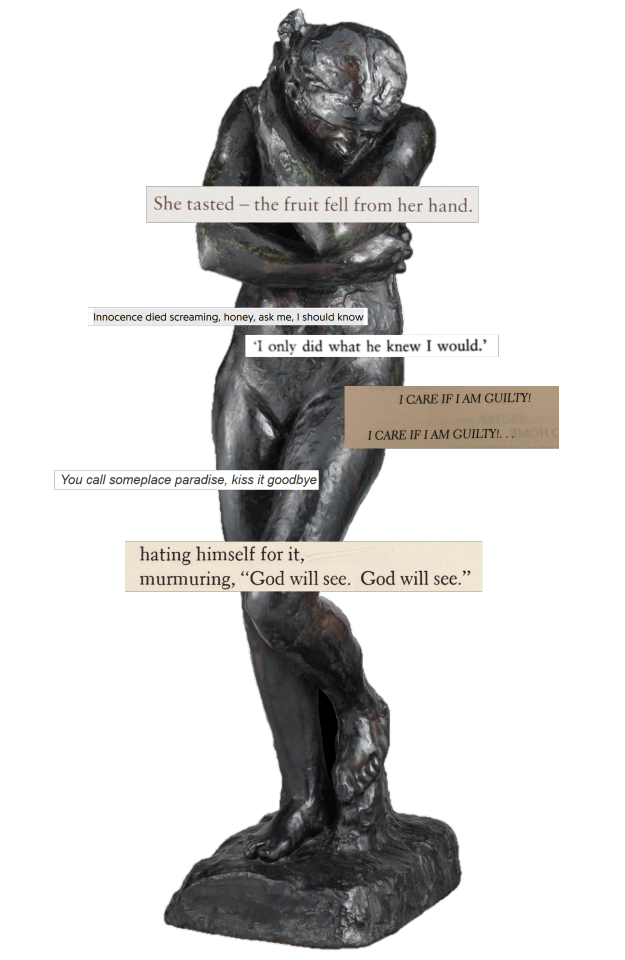
eve, after the fall (auguste rodin; bronze, 1883)
Mark Twain, The Diaries of Adam and Eve // Hozier, From Eden // Angela Carter, The Bloody Chamber // Frank Bidart, The War of Vaslav Nijinsky // Eagles, The Last Resort // Anne Sexton, Words for Dr. Y
#webs#web weaving#requests#mine#bit of an experimental one so lmk if you like the style#theme: eden#theme: shame#theme: anguish#theme: grief#theme: religion#theme: loss#theme: rejection#theme: tragedy#thanks to @shadowoftheraven15 for the request!! i know it was a couple months ago but i hope you still like it <3#auguste rodin#mark twain#hozier#angela carter#frank bidart#eagles#anne sexton#this is a reproduction in bronze; the original is in white marble but im gonna be real with you. i felt this one more. idk why#RIP I POSTED THIS ON THE WRONG BLOG FIRST
745 notes
·
View notes